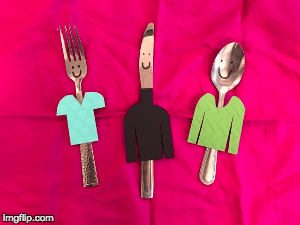By Eva Grimmer, Sustainability Office intern
With the new year upon us, it gives us a fresh opportunity to make changes in our lives for the better. Creating realistic resolutions that aren’t forgotten by February can be difficult. So the campus Sustainability Office has created a list of 10 resolutions that are easy to implement and fun to share.
Whether you choose to tackle just one or all 10, you can have peace of mind that your actions are a little more sustainable this year.
- Eat less meat (or alternatively, eat more veggies).
You don’t have to make the commitment to become vegan to make a difference. Participate in Meatless Mondays, weekday vegetarianism or even choose veggies over meat simply once a week. For some yummy inspiration, check out our Meatless Monday recipe posts on Facebook every week.
Who doesn’t love fresh veggies from our very own edible campus gardens?
- Don’t buy water bottles, bring your reusable one from home.
The reasons to avoid disposable plastic water bottles are endless. Not only do they literally take hundreds of years to decompose, but also they release toxins in the process, which are harmful to the Earth and you. Bottled water is also less regulated than tap water, and it costs exponentially more. Save the earth and your money by bringing your own water bottle to refill. Campus makes it easier than ever with water bottle refilling stations.
Campus water bottle stations make it convenient to refill on the go.
- Take public transportation/participate in active transportation.
Did you know you have access to UTA TRAX and busses for free? That’s right, your UCard doubles as a UTA pass. Just swing by the UCard Office in the Union to have it activated, and you’ll be tapping on and off in no time. When you take public transportation, you’re helping to make the air quality better by emitting fewer greenhouse gasses into the atmosphere. If you can’t use public transit everyday, try taking it a few times a week; remember every ride helps.
Or, if you’re looking for a way to burn some calories, enjoy Salt Lake’s beautiful outdoors and emit fewer greenhouse gasses. Challenge yourself to participate in more active transportation. Whether you skate, blade, bike or walk, your body and the environment will thank you.
Tapping on and off has never been so easy. How about that for a free ride?
- Eat more local products.
Local products use fewer fossil fuels to get to you, promote food safety and support the local economy. When shopping for food, opt for local products over ones that are imported. Our favorite place to shop local is at the University’s Farmers Market, which runs seasonally during the beginning of fall semester. In the meantime, check out the Community-Supported Agriculture (CSA) or the downtown winter market at Rio Grande.
Hot meals, fresh coffee and dessert to go? Yes, please!
- Divert your trash from landfills by composting your food scraps and recycling.
Those brown curbside bins aren’t just for yard waste. You can also add eggshells, tea bags, coffee grounds and fruit and veggie scraps (no meat, please). After the city collects the brown bins, the contents are processed into wood chips, mulch and compost. Your curbside blue bins are single stream, which means you can throw in paper, cardboard, plastic, aluminum and even empty aerosol cans without sorting. If you’re feeling extra ambitious, you can even recycle things like anti-freeze, batteries, glass and many others by dropping them off at locations specified here.
Separate paper, plastic and aluminum on campus. At home, you can recycle them all together.
- Make your home more sustainable and get a free energy audit from the Sustainability Office’s energy ambassadors.
Our energy ambassadors can help students assess the energy efficiency of your off-campus home. Once the audit is complete, the ambassadors provide you with information on ways you can conserve energy, and they help you install some free energy-efficient supplies. It’s as easy as signing up online and meeting with the ambassadors when it’s convenient for you. For non-students, Questar offers the same energy audit for only $25.
LED lights are much more sustainable than incandescent bulbs. Sustainability ambassadors will help you switch one out in your home.
- Skip the plastic bag and bring your own.
Did you know that plastic bags never fully decompose? Keep bags out of landfills by bringing your own. If you’re feeling extra crafty you can reuse plastic bags you have around the house by crocheting them into a stylish new one, or you can up-cycle old T-shirts into a new produce bag.
Bonus of bringing your own bag: They’re much more attractive than plastic.
- Eliminate phantom power.
Most electronic devices continue to use electricity when plugged in, even after they have been powered down. By unplugging chargers, small kitchen appliances (toaster, blender, etc.) and other household electronics, you can save on your power bill and cut down your carbon footprint.
Kill the phantom (power) in your home by unplugging electronics after you’re done using them.
- Bring your own utensils instead of using plastic disposable ones.
Say no to plastic utensils. From producer to consumer, the journey of one plastic spoon is quite long and uses many resources on the way. Cut down on this unnecessary waste by bringing your own utensils instead of using plastic ones. If you must use disposable, look for ones that can be composted after use.

Reusable utensils are happy utensils.
- Unsubscribe from junk mail and cut the paper waste.
Did you know that nearly 12 billion catalogs are sent to U.S. homes every year and that a majority of those catalogs end up in the trash? By putting your name on no-mail lists, you help eliminate unwanted paper waste.

Junk mail sure can stack up. Save time and paper by eliminating it from your home.
Creating a more sustainable lifestyle doesn’t have to be hard. In fact, many people do these things every day without even thinking twice. Challenge yourself to pick at least one of these or come up with your own sustainable resolution. Every small choice you make contributes to the sustainable community on campus.
